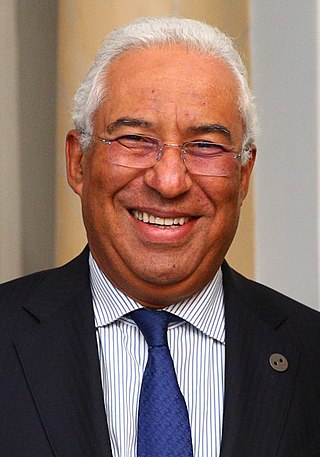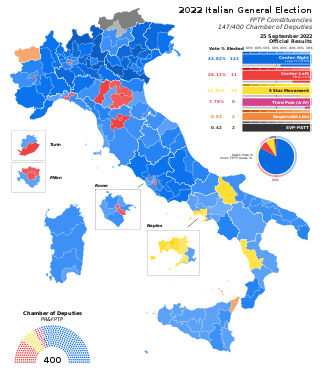
The politics of Italy are conducted through a parliamentary republic with a multi-party system. Italy has been a democratic republic since 2 June 1946, when the monarchy was abolished by popular referendum and a constituent assembly was elected to draft a constitution, which was promulgated on 1 January 1948.
In politics, a red–green alliance or red–green coalition is an alliance of "red" parties with "green" parties. The alliance is often based on common left political views, especially a shared distrust of corporate or capitalist institutions. While the "red" social-democratic parties tend to focus on the effects of capitalism on the working class, the "green" environmentalist parties tend to focus on the environmental effects of capitalism.

The South Tyrolean People's Party is a regionalist and mostly Christian-democratic political party in South Tyrol, an autonomous province with a German-speaking majority in northern Italy.

The Sammarinese Christian Democratic Party is a Christian-democratic political party in San Marino.

The Italian Republican Party is a political party in Italy established in 1895, which makes it the oldest political party still active in the country. The PRI identifies with 19th-century classical radicalism, as well as Mazzinianism, and its modern incarnation is associated with liberalism, social liberalism, and centrism. The PRI has old roots and a long history that began with a left-wing position, being the heir of the Historical Far Left and claiming descent from the political thought of Giuseppe Mazzini and Giuseppe Garibaldi. With the rise of the Italian Communist Party and the Italian Socialist Party (PSI) to its left, it was associated with centre-left politics. The early PRI was also known for its anti-clerical, anti-monarchist, republican, and later anti-fascist stances. While maintaining those traits, during the second half of the 20th century the party moved towards the centre on the left–right political spectrum, becoming increasingly economically liberal.
Liberalism and radicalism have played a role in the political history of Italy since the country's unification, started in 1861 and largely completed in 1871, and currently influence several leading political parties.

Right-wing populism, also called national populism and right-wing nationalism, is a political ideology that combines right-wing politics and populist rhetoric and themes. Its rhetoric employs anti-elitist sentiments, opposition to the Establishment, and speaking to or for the "common people". Recurring themes of right-wing populists include neo-nationalism, social conservatism, economic nationalism and fiscal conservatism. Frequently, they aim to defend a national culture, identity, and economy against perceived attacks by outsiders. Right-wing populism has remained the dominant political force in the Republican Party in the United States since the 2010s.

The Left, commonly referred to as the Left Party, is a democratic socialist political party in Germany. The party was founded in 2007 as the result of the merger of the Party of Democratic Socialism (PDS) and Labour and Social Justice – The Electoral Alternative. Through the PDS, the party is the direct descendant of the Marxist–Leninist ruling party of former East Germany, that being the Socialist Unity Party of Germany (SED). Since 2022, The Left's co-chairpersons have been Janine Wissler and Martin Schirdewan. The party holds 28 seats out of 736 in the Bundestag, the federal legislature of Germany, having won 4.9% of votes cast in the 2021 German federal election. Its former parliamentary group was the smallest of six in the Bundestag, and was headed by parliamentary co-leaders Amira Mohamed Ali and Dietmar Bartsch.

The Pact for Italy was a centrist political and electoral alliance in Italy launched by Mario Segni and Mino Martinazzoli in 1994.

Trade Unionist and Socialist Coalition (TUSC) is a socialist electoral alliance in Britain. It was originally launched for the 2010 general election.

Brothers of Italy is a national-conservative and right-wing populist political party in Italy, the country's largest after the 2022 Italian general election. The party is led by Giorgia Meloni, the incumbent Prime Minister of Italy. According to observers, Meloni's has been the "most right-wing" republican government, thus since World War II.

The 2018 Italian general election was held on 4 March 2018 after the Italian Parliament was dissolved by President Sergio Mattarella on 28 December 2017. Voters were electing the 630 members of the Chamber of Deputies and the 315 elective members of the Senate of the Republic for the 18th legislature of the Italian Republic since 1948. The election took place concurrently with the Lombard and Lazio regional elections. No party or coalition gained an absolute majority in the parliament, even though the centre-right coalition won a plurality of seats as a coalition, and the Five Star Movement (M5S) won a plurality of seats as an individual party.
The centre-right coalition is a political alliance of political parties in Italy active under several forms and names since 1994, when Silvio Berlusconi entered politics and formed the Forza Italia party. It has mostly competed with the centre-left coalition. It is composed of right-leaning parties in the Italian political arena, which generally advocate tax reduction and oppose immigration, and in some cases are eurosceptic.

The Communist Refoundation Party is a communist political party in Italy that emerged from a split of the Italian Communist Party (PCI) in 1991. The party's secretary is Maurizio Acerbo, who replaced Paolo Ferrero in 2017. Armando Cossutta was the party's founder, while Fausto Bertinotti its longest-serving leader (1994–2008). The latter transformed the PRC from a traditional communist party into a collection of radical social movements.
The centre-left coalition is a political alliance of political parties in Italy active under several forms and names since 1995, when The Olive Tree was formed under the leadership of Romano Prodi. The centre-left coalition has ruled the country for more than fifteen years between 1996 and 2022; to do so, it had mostly to rely on a big tent that went from the more radical left-wing, which had more weight between 1996 and 2008, to the political centre, which had more weight during the 2010s, and its main parties were also part of grand coalitions and national unity governments.

The 2019 Portuguese legislative election was held on 6 October 2019. All 230 seats to the Assembly of the Republic were contested.
In the years running up to the 2018 Italian general election, held on 4 March, various organisations carried out opinion polls to gauge voting intention in Italy. Results of such polls are given in this article. The date range is from the 2013 Italian general election, held on 24–25 February, to two weeks before the new election, 16 February 2018. Poll results are reported at the dates when the fieldwork was done, as opposed to the date of publication; if such date is unknown, the date of publication is given instead. Under the Italian par condicio law, publication of opinion polls is forbidden in the last two weeks of an electoral campaign.

The 2022 Italian general election was a snap election held in Italy on 25 September 2022. After the fall of the Draghi government, which led to a parliamentary impasse, President Sergio Mattarella dissolved Parliament on 21 July, and called for new elections. Regional elections in Sicily were held on the same day. The results of the general election showed the centre-right coalition led by Giorgia Meloni's Brothers of Italy, a radical-right political party with neo-fascist roots, winning an absolute majority of seats in the Italian Parliament. Meloni was appointed Prime Minister of Italy on 22 October, becoming the first woman to hold the office.
In politics, cordon sanitaire is the refusal of one political party to cooperate with certain other political parties. Often this is because the targeted party has strategies or an ideology perceived as unacceptable or radical and extremist.












